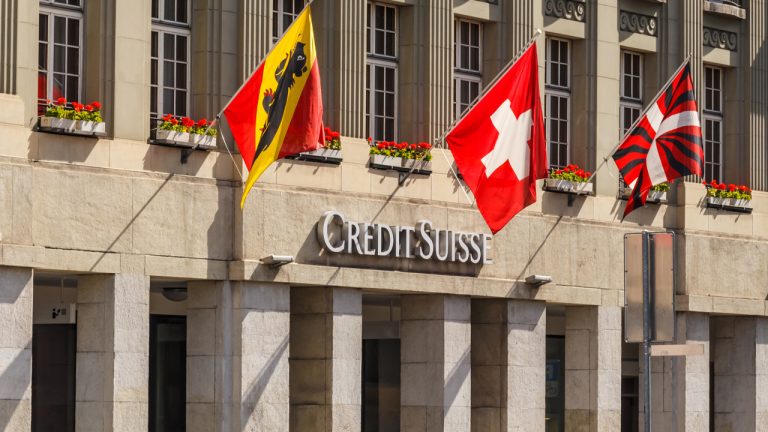 Economist Nouriel Roubini has shared his opinion about bank problems in the United States in a recently published opinion editorial. In the article, Roubini insists that “most U.S. banks are technically near insolvency, and hundreds are already fully insolvent.” Roubini: ‘Liquidity Support Cannot Prevent This Systemic Doom Loop’ The renowned economist Nouriel Roubini, also known […]
Economist Nouriel Roubini has shared his opinion about bank problems in the United States in a recently published opinion editorial. In the article, Roubini insists that “most U.S. banks are technically near insolvency, and hundreds are already fully insolvent.” Roubini: ‘Liquidity Support Cannot Prevent This Systemic Doom Loop’ The renowned economist Nouriel Roubini, also known […] The cryptocurrency hardware wallet manufacturer Ledger has raised €100 million ($109 million) in funding, according to the company’s disclosure on Thursday. Ledger CEO Pascal Gauthier says there has been significant demand for hardware wallets. He added, “2023 is even better for us because now you can’t even leave money at a Swiss bank.” Ledger to […]
The cryptocurrency hardware wallet manufacturer Ledger has raised €100 million ($109 million) in funding, according to the company’s disclosure on Thursday. Ledger CEO Pascal Gauthier says there has been significant demand for hardware wallets. He added, “2023 is even better for us because now you can’t even leave money at a Swiss bank.” Ledger to […] Credit Suisse has experienced a loss of confidence in the financial institution’s health following a significant drop in its shares’ value this week. Over the past five days, Credit Suisse shares have fallen 24.34% against the U.S. dollar, eroding trust amid fears about the global banking system. On Wednesday at around 9 p.m. (ET), Credit […]
Credit Suisse has experienced a loss of confidence in the financial institution’s health following a significant drop in its shares’ value this week. Over the past five days, Credit Suisse shares have fallen 24.34% against the U.S. dollar, eroding trust amid fears about the global banking system. On Wednesday at around 9 p.m. (ET), Credit […] Sam Bankman-Fried (SBF), the disgraced co-founder of FTX, faces four more charges after a new indictment was unsealed on Wednesday. The charges include operating an unlicensed money transfer business and conspiring to commit bank fraud. SBF Gets 4 New Charges Tacked Onto His Indictment The former CEO of FTX was originally indicted 72 days ago […]
Sam Bankman-Fried (SBF), the disgraced co-founder of FTX, faces four more charges after a new indictment was unsealed on Wednesday. The charges include operating an unlicensed money transfer business and conspiring to commit bank fraud. SBF Gets 4 New Charges Tacked Onto His Indictment The former CEO of FTX was originally indicted 72 days ago […] On Wednesday, the stablecoin project Trueusd announced that it is leveraging Chainlink Proof of Reserve (POR) technology to provide real-time verification for the minting of trueusd tokens. The trueusd crypto asset has a circulating supply of over 968 million tokens and is the sixth-largest stablecoin by market capitalization. Archblock Uses Chainlink to Verify Reserves Before […]
On Wednesday, the stablecoin project Trueusd announced that it is leveraging Chainlink Proof of Reserve (POR) technology to provide real-time verification for the minting of trueusd tokens. The trueusd crypto asset has a circulating supply of over 968 million tokens and is the sixth-largest stablecoin by market capitalization. Archblock Uses Chainlink to Verify Reserves Before […]
The new proposals set forth by the Gensler-led SEC seek to “expand the scope” of rules set out by the 2009 Custody Rules.
A five-member panel of the United States Securities Exchange Commission (SEC) has voted 4-1 in favor of a proposal that may make it more difficult for cryptocurrency firms to serve as digital asset custodians in the future.
The proposal, which is yet to be officially approved by the SEC, recommends amendments to the “2009 Custody Rule” will apply to custodians of “all assets” including cryptocurrencies, according to a Feb. 15 statement from SEC Chairman Gary Gensler.
Gensler stated that currently, some crypto trading platforms that are offering custody services are not actual “qualified custodians.”
According to the SEC, a qualified custodian is generally a federal or state-chartered bank or savings association, trust company, a registered broker-dealer, a registered futures commission merchant, or a foreign financial institution.
In order to become a “qualified custodian” under the newly proposed rules, U.S. and offshore firms would additionally need to ensure that all custodied assets — including cryptocurrencies — are properly segregated, while these custodians will be required to jump through additional hoops such as annual audits from public accountants, among other transparency measures.
We @SECGov just proposed to expand & enhance the role of qualified custodians when registered investment advisers custody assets on behalf of investors.
— Gary Gensler (@GaryGensler) February 15, 2023
Thru our rule, investors would get the time-tested protections—and qualified custodians—they deserve.
What does this mean? ⬇️ pic.twitter.com/RerUGnpArI
While Gensler said these amendments would “expand the scope” to all asset classes, he specifically took a shot at the crypto industry:
“Make no mistake: Today’s rule, the 2009 rule, covers a significant amount of crypto assets. [...] Further, though some crypto trading and lending platforms may claim to custody investors’ crypto, that does not mean they are qualified custodians. Rather than properly segregating investors’ crypto, these platforms have commingled those assets with their own crypto or other investors’ crypto.”
“When these platforms go bankrupt—something we’ve seen time and again recently—investors’ assets often have become property of the failed company, leaving investors in line at the bankruptcy court,” the SEC Chairman added.
Gensler also pointed to the industry's track record to suggest that few crypto firms would be reliable enough to serve as qualified custodians:
“Make no mistake: Based upon how crypto platforms generally operate, investment advisers cannot rely on them as qualified custodians.”
However, not every SEC member is on board with Gensler’s plans.

While the proposal isn’t “regulation by enforcement” per se, Commissioner Hester Peirce said “the latest SEC statement seems designed for immediate effect” to take down the crypto industry:
“Such sweeping statements in a rule proposal seem designed for immediate effect, a function proposing releases should not play. These statements encourage investment advisers to back away immediately from advising their clients with respect to crypto.”
As for the proposal itself, Peirce believes it would do more harm than good.
She explained that such stringent measures will force investors to remove their assets from entities that have developed sufficient safeguarding procedures to mitigate and prevent fraud and theft:
“The proposal would expand the reach of the custody requirements to crypto assets while likely shrinking the ranks of qualified crypto custodians. By insisting on an asset neutral approach to custody we could leave investors in crypto assets more vulnerable to theft or fraud, not less.”
As for the next steps, Peirce noted the agency will soon schedule in a 60-day comment period once the proposal has been published in the Federal Register.
Related: US lawmakers and experts debate SEC’s role in crypto regulation
However, the commissioner is concerned that this timeframe isn’t sufficient to allow the public to analyze all aspects of the proposal.
Those who voted in favor of the proposal are hoping to implement the new rules within 12-18 months, according to Peirce, adding that it was an "aggressive timeline" given the changes being proposed
 You know what they say, “when life gives you lemons, make lemonade.” But when it comes to protecting your crypto funds on centralized exchanges (CEXes), the old adage should be “when life gives you regulations, make a self-custody wallet.” Self-custody is undoubtedly a better solution for protecting the interests of customers in crypto. Regulation alone […]
You know what they say, “when life gives you lemons, make lemonade.” But when it comes to protecting your crypto funds on centralized exchanges (CEXes), the old adage should be “when life gives you regulations, make a self-custody wallet.” Self-custody is undoubtedly a better solution for protecting the interests of customers in crypto. Regulation alone […]
Grayscale had expected it wouldn’t be able to voice arguments until the second quarter, and is calling the quicker timeline “welcome news.”
A United States appeals court is set to hear the oral arguments relating to Grayscale Investment’s lawsuit against the Securities and Exchange Commission (SEC) over its decision to deny Grayscale’s Bitcoin (BTC) spot exchange-traded fund (ETF).
According to a court motion filed on Jan. 23, both sides will present their arguments at the District of Columbia Court of Appeals on March 7, at 9:30 am local time.
Oral arguments are spoken presentations delivered by attorneys summarizing why their clients should win the case. Each party in the case takes turns directly speaking and answering questions from the judge and is given equal amounts of time to do so.
Mark your calendars. Oral Arguments in our case challenging SEC decision to deny $GBTC conversion to a spot #bitcoin ETF was just scheduled for
— Craig Salm (@CraigSalm) January 24, 2023
*Tuesday, March 7, 2023 @ 930 AM EST*. pic.twitter.com/PMQVUsebMO
In a tweet on Jan. 24, Grayscale Chief Legal Officer Craig Salm said the newly filed motion was “welcome news” as they were previously anticipating oral arguments to be scheduled “as soon as Q2.”
The composition of the argument panel in the Grayscale case will be revealed on Feb. 6, 30 days prior to the date of the oral argument, while the amount of time for the argument will be set in a separate order, according to the motion.
Grayscale initiated its lawsuit against the SEC in June after the regulator rejected its application to convert its $12 billion Grayscale Bitcoin Trust (GBTC) into a spot-based ETF.
Earlier this month, Grayscale filed a reply brief with the D.C. Court of Appeals, claiming the SEC acted arbitrarily in treating spot-traded ETFs differently from futures-traded products and that the SEC exceeded its authority when it denied Grayscale’s application for a Bitcoin ETF.
Related: SEC’s ‘one-dimensional’ approach is slowing Bitcoin progress: Grayscale CEO
Grayscale CEO Michael Sonnenshein reiterated a similar point during an interview on CNBC’s Squawk Box on Jan. 24, stating:
“It’s important to remind the role that regulators like the SEC play when it comes to investors. They’re not here to tell investors what to or what not to invest in. They’re here to ensure all the proper disclosures are made [...] so [investors] are aware of all the risks associated.”
"Crypto is here to stay. Regulators are not here to tell investors what to and what not to invest in. They're here to ensure all the proper disclosures are made...so investors understand all the risks associated," says @Grayscale @sonnenshein. "That's really the role of the SEC." pic.twitter.com/k30y6DewBe
— Squawk Box (@SquawkCNBC) January 24, 2023
Sonnenshein said they were “certainly expecting” a decision from the courts regarding its case against the SEC in “Q2 or Q3 of this year.”
“The frustrating thing for investors and certainly the Grayscale team is that we’re actually a business that was born in the U.S., made use of existing U.S. regulatory frameworks to bring crypto to investors in a safe and compliant way.”
“Meeting with both houses yesterday and today, what we’re really hearing [...] is that had the SEC already approved this spot-Bitcoin ETF [...] a lot of the recent investor harm we’ve seen in crypto would’ve been prevented,” he added.
 Following the Terra stablecoin collapse last May, the Terra blockchain ecosystem has another stablecoin concept in the works called “Solid.” The stablecoin Solid and its white paper were revealed by a decentralized finance (defi) project, Capapult Finance, and the idea has been dubbed a “soft-pegged stablecoin” built on Terra. Terra Blockchain Ecosystem to See a […]
Following the Terra stablecoin collapse last May, the Terra blockchain ecosystem has another stablecoin concept in the works called “Solid.” The stablecoin Solid and its white paper were revealed by a decentralized finance (defi) project, Capapult Finance, and the idea has been dubbed a “soft-pegged stablecoin” built on Terra. Terra Blockchain Ecosystem to See a […]
The SEC must submit its brief by Nov. 9. After that, Grayscale will then submit a reply brief on Nov. 30 before both parties submit a final brief on Dec. 21.
Digital asset manager Grayscale has filed its opening brief against the U.S. Securities Exchange Commission (SEC) to challenge its decision denying Grayscale’s application to convert the Grayscale Bitcoin Trust (GBTC) to a spot Bitcoin ETF.
The world’s largest digital asset management firm filed its opening legal brief on Oct. 11 in the U.S. Court of Appeals in the District of Columbia Circuit, in which it claimed the SEC’s knockback to be “arbitrary, capricious and discriminatory.”
Grayscale argued that the SEC treats spot Bitcoin Exchange-Traded Products (ETPs) with “special harshness” and is doing so “in excess of its statutory authority.”
Attorneys for Grayscale argued that several Bitcoin Futures ETFs that have been previously approved by the SEC generate their prices based on the same indices as the spot Bitcoin ETF.
They stated that the SEC could not rationally conclude that Bitcoin Futures ETFs do not take on “the very same risks in the very same market” as the spot Bitcoin ETF, adding:
“Although Bitcoin may be a relatively new asset, the legal issue here is straightforward. The Commission has violated the APA’s most basic requirements by failing to justify its vastly different treatment of Bitcoin Futures ETPs and spot Bitcoin ETPs.”
Grayscale also argued that the SEC’s “significant-market test” — one which assesses whether an exchange’s proposal to list an ETP is “designed to prevent fraudulent and manipulative acts and practices” – is “flawed” and that the SEC “set the bar so high” that it couldn’t possibly be satisfied.
Attorneys for Grayscale also noted that this significant-market test only applies to Bitcoin-related ETPs — which led them to believe that they have been discriminated against.
Grayscale also argued the SEC’s decision “harms the 850,000 investors who own shares in the Trust”:
“Given that the Commission did not approve the Trust to trade as an ETP on the Exchange, the value of its shares cannot closely track the value of the Trust’s underlying Bitcoin assets— depriving Trust shareholders of billions of dollars in value.“
“There is simply no justification for continuing to inflict such serious investor harm,” the brief stated.
Related: Grayscale legal officer says Bitcoin ETF litigation could take two years
The filing in the U.S. Court of Appeals comes after the SEC officially denied Grayscale’s application to convert GBTC to a spot Bitcoin ETF on Jun. 29.
On the same day, Grayscale initiated litigation by filing a “Petition For Review.”
According to Grayscale, the SEC must submit its brief by Nov. 9. Grayscale will then submit a reply brief on Nov. 30 before both parties submit a final brief on Dec. 21.
Grayscale had $26.4 billion in assets under management (AUM) in Mar. 2022.